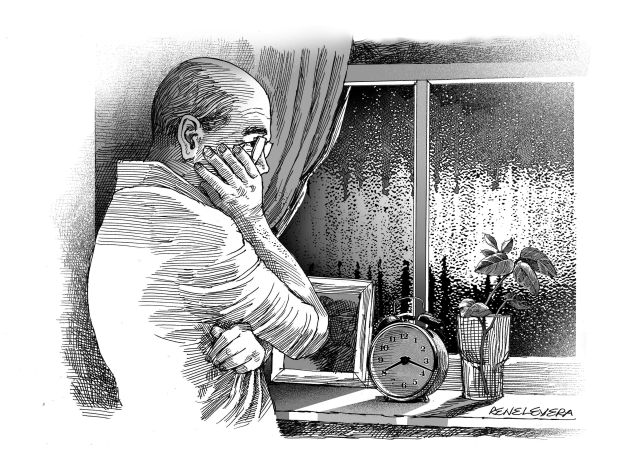
Before retiring last night, I had our lamp and radio, two vital tools during a calamity, recharged. The weather reports had warned of a tropical storm that would make landfall after midnight. We happened to live in its path and so we prepared ourselves for a bit of menacing weather, expecting the onslaught of strong winds and heavy rains in the morning. I fixed the alarm of the radio clock to set off at daybreak during the height of the storm’s fury, hoping to get on-the-spot news of the situation.
The rains and the winds did come, at dawn, but not with the duration and intensity that I expected, and it seemed that an ordinary squall, rather than a feared storm, had arrived. In fact I pulled aside the blinds and opened the balcony to allow the gusts to freshen our room.
The alarm went off in due course, and on the radio a voice came on, announcing that the storm had veered towards the west and had spared us. I heaved a sigh of relief and said a prayer of thanks.
In times like this, we have no choice but to wait, and during the waiting prepare for whatever might happen. With storms and typhoons we get a sufficient warning and have the advantage of time. But not with earthquakes, which no one can predict, for which we, who dwell in an area in which earthquakes periodically occur, must always get ready. Since we do not know when the next earthquake will strike, we can have no better attitude than an attitude of waiting and vigilance.
In this, the people in the time of Noah, learned a lesson. When speaking of the end times, Jesus alluded to them to drive home the need for watchfulness. This we read in Matthew’s Gospel:
“For as it was in the days of Noah, so it will be at the coming of the Son of Man. In [those] days before the flood, they were eating and drinking, marrying and giving in marriage, up to the day that Noah entered the ark. They did not know until the flood came and carried them all away. So will it be [also] at the coming of the Son of Man. Two men will be out in the field; one will be taken, and one will be left. Two women will be grinding at the mill; one will be taken, and one will be left. Therefore, stay awake! For you do not know on which day your Lord will come. Be sure of this: if the master of the house had known the hour of night when the thief was coming, he would have stayed awake and not let his house be broken into. So too, you also must be prepared, for at an hour you do not expect, the Son of Man will come.”
Years ago, the day before a super typhoon hit the country, we saw a similar scene—of people going about their lives as in ordinary times, enjoying the night in their usual haunts, not knowing that in the next several hours many of them would die from the monstrous storm surge.
Since, in physical terms, our arrangements for our safety cannot go beyond boarding up the windows and storing food or evacuating to a less dangerous place, and similar preparations, especially in the case of a calamity such as an earthquake, whose happening we cannot foretell, we need to raise our readiness to a higher, biblical level, and gear up for no less than the day of the Lord’s coming. For which the best preparation is a righteous life.
Which does not mean that in the meantime we cannot enjoy the moment. As Paul Claudel said, “Gentlemen, in the little moment that remains to us between the crisis and the catastrophe, we may as well drink a glass of Champagne.”